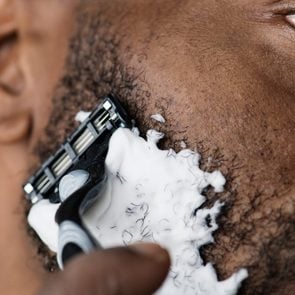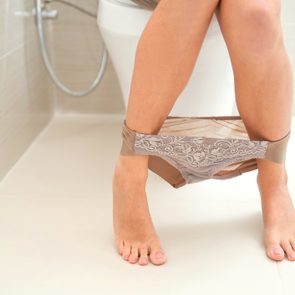How’s Your Sexual Hygiene? A Doctor Says This Habit Is a Must (for Singles, Too)
Updated: Sep. 21, 2022
Plus, wise up on six outdated myths about down-there self-care, and shop our list of vetted sexual hygiene products for total wellness.
It’s safe to say we’ve all been thinking a little extra about hygiene and staying healthy. Where that turns to romance, maybe the movies make a quickie on the kitchen counter look appealing… but in real life, you may have a few hesitations based in reality—as in, Eesh, I probably should’ve showered today, or, Can you contract Salmonella from getting naked on the same spot where we prepped the raw chicken last night?
Unless you’ve got a mysophilia kink (this draw toward dirty, grimy stuff is an actual thing), it’s likely you’d enjoy sex even more if you and your partner (and your quartz countertop) were clean. Experts on the topic suggest these questions aren’t just for germaphobes. This concept, known as “sexual hygiene,” is prime learning for anyone who’s invested in taking optimal care of their health these days.
What is good sexual hygiene?
Sexual hygiene is the practice of cleanliness before, during, and after sex. But, says Eric M. Garrison, a certified sex counselor and educator, while sexual hygiene focuses on cleanliness, it’s really about protecting the physical, and mental, health of you and your partner (if you’ve got one). “At its core, sexual hygiene is about what you can do to minimize risk while maximizing pleasure,” Garrison tells The Healthy. And when you think about it, sex is more enjoyable if you’re freed up from worries to focus on the act.
And even if you’re not in a relationship, it’s still important to keep up your sexual health. That’s advice from Sherry A. Ross, MD, an OB-GYN in Santa Monica, California, and the author of She-ology: The Definitive Guide to Women’s Intimate Health. For singles, Ross explains you can think of sexual hygiene as an aspect of your overall health, raising your self-care standards while giving you a space to routinely monitor your body for any changes.
And if all this sounds a little too clinical to seem hot, consider what Garrison points out: Maintaining an intimate wellness regimen can actually amplify how sexy you feel. If you’ve ever known someone who goes for a monthly bikini wax just because it makes them feel great—or who, perhaps, has caught onto the growing American bidet trend, well… that intrepid ownership of a self-care practice translates to greater confidence. Indeed that certainly can be sexy.
Sexual hygiene myths

Before you learn these doctors’ sexual hygiene musts, break out of these common untruths about taking care of your body:
Sexual hygiene myth #1: Your privates should smell good, or like nothing at all.
“Bodies should smell like clean bodies,” Garrison says. While our culture might encourage applying products with fragrances or other harsh chemicals, doing so to your privates can cause dryness, allergic reactions, and sometimes infection, he adds.
If your genitals clearly have a strong, bad odor, that can be a sign of infection (it’s also not unheard of to forget you’ve had a tampon in for days). Otherwise, the way you smell is typically normal. (For more on this, check out Vaginal Odor: What’s Normal and What’s Not.)
Sexual hygiene myth #2: Pubic hair is unhygienic.
Trimming tools, Brazilian waxes, and “manscaping” have all grown in popularity over the past two decades. But, whether you opt for any of these routines or keep all your hair down there, Dr. Ross explains that pubic hair exists for several reasons. “Pubic hair protects sensitive areas,” she says, adding that this hair also holds hormones that increase sexual desire.
Sexual hygiene myth #3: A circumcised man doesn’t need to clean his privates.
Well, yes he does. Whether you’ve been circumcised or not, a man can experience a “smegma”—a buildup of dead skin cells, sweat, and body oils. Garrison says not cleaning this can lead to what many partners might consider an off-putting odor, as well as increase your risk for infection.
All you need is a little extra cleaning around the foreskin and head of the penis, especially when you notice that it’s starting to build up.
Sexual hygiene myth #4: Infections and diseases are evident to the eye.
It might be natural to think of clearly visible conditions, like herpes and genital warts, as the most dreadful sex-related illnesses—but remember that some of the most clinically concerning STIs are entirely invisible.
For example, some strains of the human papillomavirus, more commonly known as HPV (which affects 80% of sexually active people at some point), can lead to cervical cancer. Dr. Ross reminds us that even those conditions that can present as external signs, like herpes, can have long dormant periods, says Dr. Ross. That’s why it’s always important to practice safe sex, get tested regularly for STDs, and recognize the willingness to discuss sexual history as part of a healthy partnership.
Sexual hygiene myth #5: Genitals need to be disinfected.
In the age of sanitizing everything, this is a tempting one to believe. But do not—we repeat, do not—put hand sanitizer or antibacterial soap on your genitals, ever. Not only will it most likely burn like the devil, but Dr. Ross also advises this is unnecessary: “Genitals don’t need to be disinfected, and using harsh cleansers—including hand sanitizer—can cause pain and injury,” she says.
Yeah. Ouch.
Sexual hygiene myth #6: Cleaning requires a good scrubbing.
Even though these health professionals encourage good sex hygiene, it’s important not to go overboard with the elbow grease.
You don’t need to use a scrub brush, loofah, or other special tool, and always be gentle when handling your own private area. If you have a vulva and labia, wipe gently—and avoid cleaning inside the vagina. “This includes vaginal douches!” Dr. Ross says. “The vagina is self-cleaning.”
Good sexual hygiene begins before you have sex
No matter your gender, sexual preference, or what type of sex you’re having (including solo play, which may deliver some health benefits), there are some tips our experts recommend you should try to do every time you’re preparing to get frisky.
With that said, Garrison recognizes that “sometimes sex is spontaneous,” and says sexual hygiene is “not about perfection . . . but about doing your best to optimize your hygiene.”
And maybe this point should go without saying, but perhaps most importantly: For optimal sexual health, it’s crucial that you feel comfortable asking your partner about how their sexual history may play into any potential illnesses or infections that they could pass onto you. If you don’t feel satisfied or sufficiently clued in to their background with what they share, it is more than OK to call game over.
Beyond that essential, here are our experts’ pre-sex steps for keeping solid sexual hygiene:
The day-of:
• Clean, sanitize, and prepare any sex toys you plan on using.
• Place out condoms or prepare other contraceptives.
• Have lube handy (and consider wiping down the container for this and any other product with a minimum 60% alcohol solution or a disinfecting wipe).
• Trim and scrub your fingernails with a clean nailbrush and hot, soapy water (keeping in mind long or fake fingernails harbor more bacteria than short, groomed nails).
• Stack clean towels nearby, along with a basket where you can toss them after use.
Then, as the moment approaches:
• Wash your hands with soap and water.
• Do a quick wipe-down of your body with a warm, wet rag. You can use this step as a moment to check your body for any open sores, including cold sores or bleeding gums in the mouth, as diseases can be transmitted from the mouth to the genitals (and vice versa).
• Rinse off your genital area with warm water to gently remove any buildup or discharge.
• Brush your teeth, and consider using mouthwash to help eliminate germs.
What’s good sexual hygiene during sex?
Dr. Ross suggests that during the act itself, sexual hygiene can help prevent infection and disease, as well as pain, discomfort, and the occasional embarrassing moment (we’ve all had them):
• Use condoms to prevent sexually transmitted diseases.
• Change the condom or clean your finger, toy, or penis before changing from anal to vaginal or oral penetration.
• Cover sex toys that can’t be disinfected (like the string part of anal beads) with a clean condom.
• Contain menstrual blood with a towel or a disposable menstrual cup or disc.
Note: Not all menstrual cups and discs are OK for sex. Always check the packaging and speak with your licensed women’s health professional to determine whether you have the type that is safe to be worn during intercourse.
Also understand that menstrual cups and discs do not provide protection against pregnancy or sexually transmitted infections. If you wear yours during sex, you should immediately remove and wash it afterward.
What should you do after sex?
You can grab one of the clean towels you stocked nearby to catch any fluid. If showering immediately after sex makes you feel most comfortable, go for it—but from a hygiene standpoint, Garrison says, there’s no need to immediately rise and rinse off. “This is the time to enjoy pillow talk or a pint of Ben & Jerry’s,” he says. “Prioritize this time for bonding and reflecting.”
Once you’re ready, however, there are some things our experts recommend to clean up after sex:
• Use a warm cloth to wipe off any fluids.
• Urinate to flush out any bacteria that may be hiding at the opening of the urethra.
• Clean and put away used sex toys.
• Get regularly tested for sexually transmitted infections (including a Pap smear, if this applies anatomically).
• Make sure you go for your regular health checkups.
Products to help with good sexual hygiene
Inspired to up your sexual hygiene game? From our doctors and well-versed online shoppers, here are a few recommended items that could prove to be worthwhile additions to your routine.
365 by Whole Foods Market Foaming Fragrance-Free Hand Soap
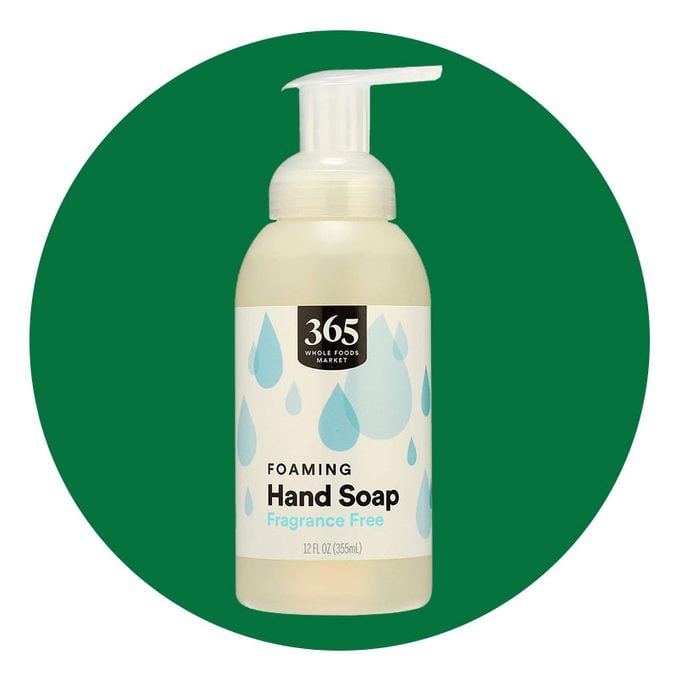
For gentle but effective hand-washing, this Whole Foods soap, free of fragrances, colors, and other allergens, has earned well over 1,000 Amazon reviews with an average near five-star rating. One verified purchaser, Mandy, said they found this product safe for eczema, while another, crabapple (who identifies as having a fragrance allergy), called this soap “the cure!” and added: “Some products pretend to be fragrance free. This is.”
More good news about this hand soap? It’s also generally safe to use on the genital area.
Goodwipes Down There Hygiene Wipes
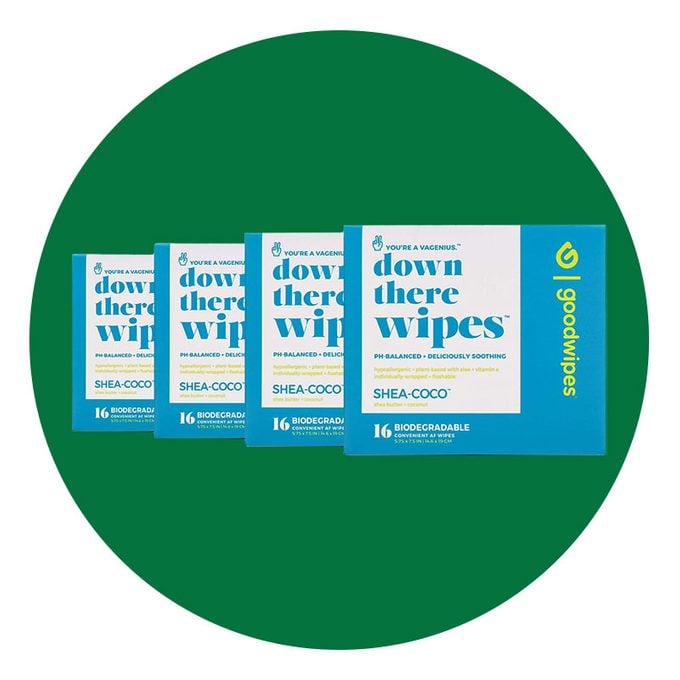
These flushable, pH balanced and hypoallergenic wipes are specially designed for use on and around the genitals. Nicole, a verified purchaser who reported that medical treatments left her skin extremely sensitive, called Goodwipes “the ONLY wipes I can use. They soothe the delicate skin in personal areas.”
Verified purchaser nightreader said: “Of all the cloths I’ve used for intimate and bathroom cleansing, these are the best,” calling these wipes “just the right amount of wet and the scent is one that I believe both women and men could get along with. They clean really well, and flush easily. Best of all, unlike other cleansing cloths, these are not irritating to tender skin. I carry these with me in the packets and they have really come in handy in public restrooms.”
Dude Wipes
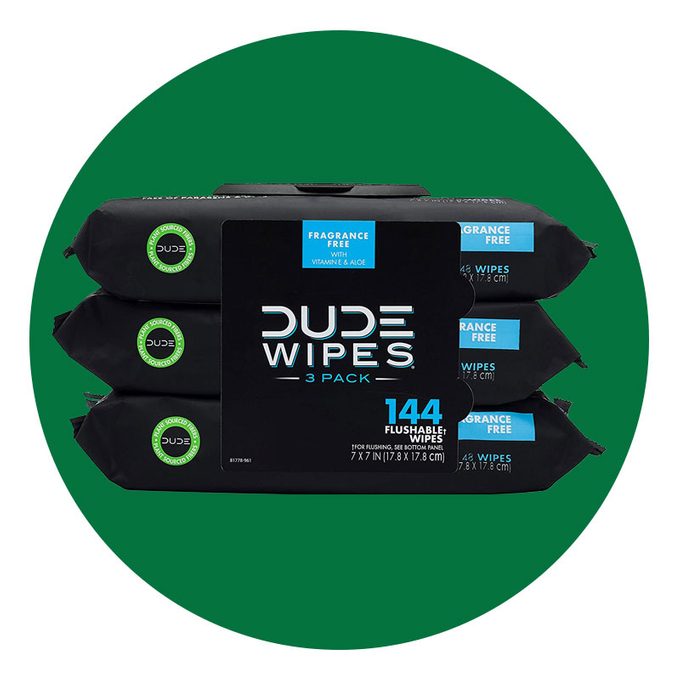
If you prefer wipes with a little more masculine flare, these might be your pick. One shopper commented on the ideal size and moisture of these wipes, also describing the scent and packaging as “subtle.”
Note that while Dude Wipes are marketed as being flushable, some Amazon reviewers revealed that they’d run into plumbing problems after flushing. (From Family Handyman, one of our sibling sites, may we suggest 6 Ways To Unclog a Toilet Without a Plunger. You’re welcome.)
For regular sex and self-care wisdom, sign up for The Healthy‘s daily newsletter. Also, keep reading:
10 Easy Self-Care Swaps to Make in 2022
It Takes Two: How To Motivate Your Partner To Exercise Together
The One Item a Sex Expert Recommends Buying for Better Orgasms


















